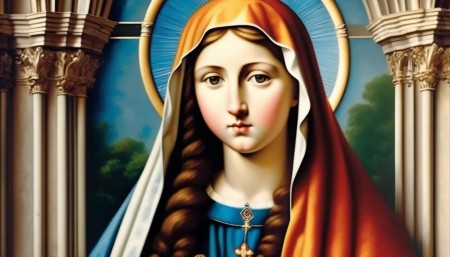We ask you, urgently: don’t scroll past this
Dear readers, Catholic Online was de-platformed by Shopify for our pro-life beliefs. They shut down our Catholic Online, Catholic Online School, Prayer Candles, and Catholic Online Learning Resources—essential faith tools serving over 1.4 million students and millions of families worldwide. Our founders, now in their 70's, just gave their entire life savings to protect this mission. But fewer than 2% of readers donate. If everyone gave just $5, the cost of a coffee, we could rebuild stronger and keep Catholic education free for all. Stand with us in faith. Thank you.Help Now >
What science tells us about the mother-child bond
FREE Catholic Classes
The developing science of Microchimerism can lead us to a deeper appreciation for the role of Mary, the mother of Jesus, in salvation history. It also has great relevance to those who have lost a child to abortion, and our personal relationship with the Blessed Virgin Mary as our Mother in Faith.

Highlights
Microchimerism is defined as the presence of two or more genetically distinct cell populations in one individual.
Dr. Timothy Millea, an orthopedic surgery specialist from Davenport, IA, explains what Microchimerism reveals to us about the intimate physical relationship between a mother and the child developing in her womb:
In the first few weeks after conception, cells from both mother and baby pass back and forth across the placenta. During pregnancy, up to 10 percent of the DNA in the mother's bloodstream comes from her baby. After the baby is born, the percentage of the baby's DNA in the mother drops, but some cells remain functional for the rest of the mother's life.
Dr. Millea said cells of the child have been found in a mother's blood and all major organs, including the heart. After birth, a child will have cells from its mother living within his/her body.
The teachings of the Church Fathers, and the development of Catholic theology and doctrine, reveal an intuitive understanding of this intimate relationship between Mary and Jesus.
In 1854, Pope Pius IX solemnly declared the longstanding belief of the Church that Mary was conceived free from original sin. Some can understandably struggle to understand this concept.
But consider the Immaculate Conception of Mary in the context of what science is revealing about the intimate cellular relationship between mother and child. Doesn't it make sense that Mary, a daughter of Zion, would need to be prepared and blessed in a special way by God the Father?
In anticipation of her Son's work of salvation, and the liberation of the human family from the slavery of sin, she was preserved by God from the stain of original sin. In her Immaculate Conception, and later in the Annunciation when she was "overshadowed" by the Holy Spirit in the conception of Jesus, Mary was made an acceptable tabernacle to receive her Divine Son.
Microchimerism and Abortion Loss
Those involved in outreach to women and men hurting after abortion, can testify to how the phenomena of Microchimerism has a special relevance to parents of aborted children.
On a recent Rachel's Vineyard abortion healing retreat, a woman shared something we have heard countless times from mothers of aborted children:
"After my abortion, I felt like I lost part of myself, something in me died that day when I went in for the procedure. I got on with my life, but I was haunted at times by that decision, by the child I rejected."
Science now reveals to us that abortion is not primarily about choice, bodily autonomy, or just another hot-button issue in our ongoing culture wars. It's about an intimate relationship of a mother with her developing child. Even after the child's life is ended, the baby's cells live on in the mother.
Abortion is a deeply wounding physical, emotional and spiritual loss for a pregnant mother, and for fathers as well. It's natural to want to ignore and deny something that we can't process and integrate into our lives. Mothers and fathers want to get away from the pain and focus on the future. They find various ways to rationalize and justify their decision to end the life of their developing child.
But there are times when the loss of the child breaks through this denial: In haunting dreams when the defenses are down; with the pregnancy and birth of a wanted child; the death of a parent, or a spiritual awakening.
So many women and men will share how they felt so alone in their conflicted feelings after the abortion. "I didn't think anyone else felt like this," one mother said. "Sometimes I wondered if I was going crazy."
Actually, given what we are learning about Microchimerism, and the intimate biological relationship between mother and child, this mother is far from "crazy." Her reaction is a natural response to an intimate loss. It also points to the need to bring spiritual and emotional healing to that parent/child relationship that has been damaged by abortion.
The Blessed Sacrament: Mary's Mystical Relationship with Her Children
As we journey to the end of Lent and the events of Holy Week, this biological intimacy of Mary and Jesus takes on a significance that touches each of us personally.
After hours of brutal torture and approaching his death, Jesus makes a profound gesture to the Apostle John and his Mother Mary at the foot of the cross:
"When Jesus saw his mother and the disciple there whom he loved, he said to his mother, "Woman, behold, your son." Then he said to the disciple, "Behold, your mother." (John 19:26-27).
Deacon Keith Fournier explains the greater significance of this passage from John's Gospel; "The Church Fathers taught correctly that this gesture was not just a gift to John. Jesus entrusted all of us to Mary's maternal care."
When we integrate this understanding of Microchimerism into what the Church teaches about the Real Presence of the Blessed Sacrament (i.e., the real presence of the body and blood of Jesus under the appearance of bread and wine) we encounter a great mystery.
The community of believers in the Risen Lord Jesus is described by St. Paul as The Body of Christ. You and I as members of Christ's body have an intimate spiritual and physical relationship with Jesus...and Mary. With our reception of the Eucharist, Mary is now, on a physical and spiritual level, truly our Mother in faith.
I hope and pray you draw closer to the Mother of Jesus in this coming Holy Week and Easter season. Entrust yourself to Mary as to her child. Ask her to accompany you as you journey with her son Jesus through his suffering and death, and witness His glorious resurrection.
It is also my prayer that this original meditative song, entitled "Mary," may bless you in your journey of faith. I dedicate this song to honor Mary with love and respect as my Mother in Faith, and to my biological mother, Marie Kane Burke.
Kevin Burke, LSW, is a pastoral associate of Priests for Life and co-founder of Rachel†s Vineyard. An expert on men and abortion loss, he is the author of Tears of the Fisherman and co-author of Rivers of Blood/Oceans of Mercy.
Join the Movement
When you sign up below, you don't just join an email list - you're joining an entire movement for Free world class Catholic education.
-

-
Mysteries of the Rosary
-
St. Faustina Kowalska
-
Litany of the Blessed Virgin Mary
-
Saint of the Day for Wednesday, Oct 4th, 2023
-
Popular Saints
-
St. Francis of Assisi
-
Bible
-
Female / Women Saints
-
7 Morning Prayers you need to get your day started with God
-
Litany of the Blessed Virgin Mary
Daily Catholic
 Daily Readings for Tuesday, November 26, 2024
Daily Readings for Tuesday, November 26, 2024 St. John Berchmans: Saint of the Day for Tuesday, November 26, 2024
St. John Berchmans: Saint of the Day for Tuesday, November 26, 2024 Act of Entrustment to Mary: Prayer of the Day for Tuesday, November 26, 2024
Act of Entrustment to Mary: Prayer of the Day for Tuesday, November 26, 2024- Daily Readings for Monday, November 25, 2024
- St. Catherine of Alexandria: Saint of the Day for Monday, November 25, 2024
- Guardian Angel Prayer #3: Prayer of the Day for Monday, November 25, 2024
![]()
Copyright 2024 Catholic Online. All materials contained on this site, whether written, audible or visual are the exclusive property of Catholic Online and are protected under U.S. and International copyright laws, © Copyright 2024 Catholic Online. Any unauthorized use, without prior written consent of Catholic Online is strictly forbidden and prohibited.
Catholic Online is a Project of Your Catholic Voice Foundation, a Not-for-Profit Corporation. Your Catholic Voice Foundation has been granted a recognition of tax exemption under Section 501(c)(3) of the Internal Revenue Code. Federal Tax Identification Number: 81-0596847. Your gift is tax-deductible as allowed by law.







 Daily Readings for Tuesday, November 26, 2024
Daily Readings for Tuesday, November 26, 2024 St. John Berchmans: Saint of the Day for Tuesday, November 26, 2024
St. John Berchmans: Saint of the Day for Tuesday, November 26, 2024 Act of Entrustment to Mary: Prayer of the Day for Tuesday, November 26, 2024
Act of Entrustment to Mary: Prayer of the Day for Tuesday, November 26, 2024


